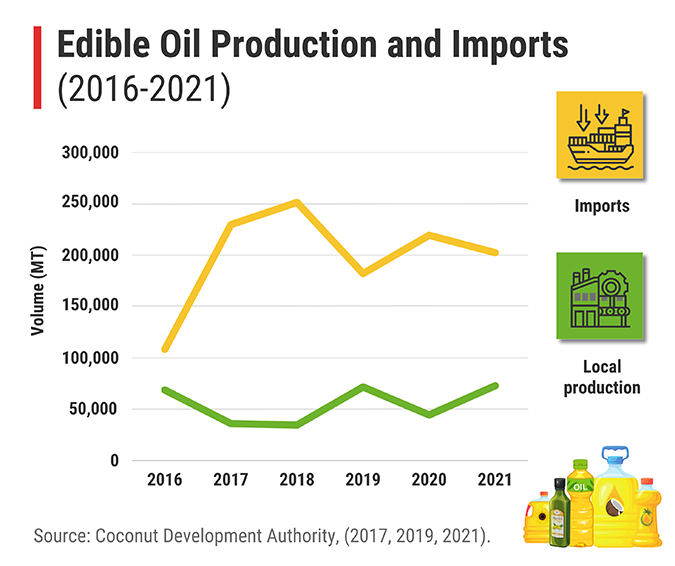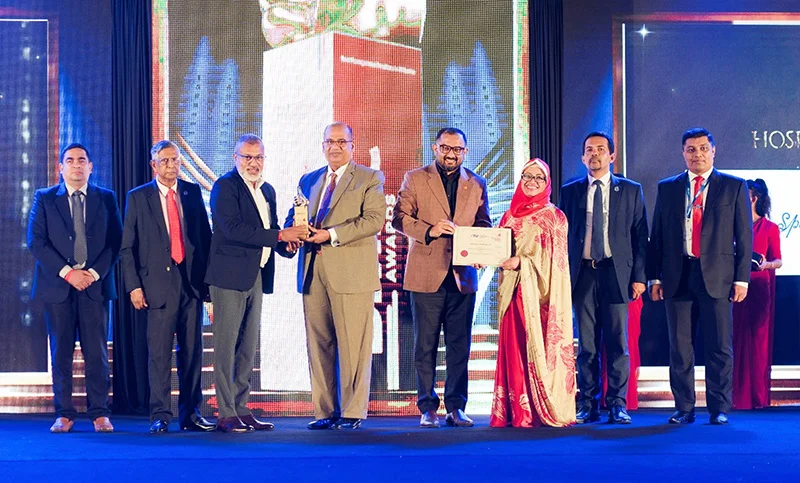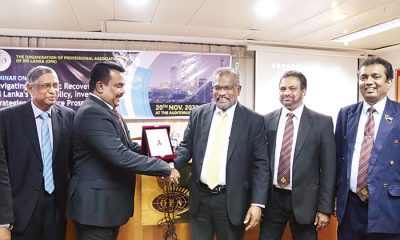Business
New IPS publication, ‘Palm Oil Industry in Sri Lanka: An Economic Analysis’

Q&A Explainer with Author
Featuring:Dr Erandathie Pathiraja
Research Fellow – Institute of Policy Studies of Sri Lanka
- The palm oil industry in Sri Lanka saves USD 17 million annually in foreign exchange and contributes to the economy through employment and capital investments.
- Oil palm cultivation was allowed initially to reduce reliance on imported palm oil, but concerns over environmental and health impacts led to a decision to phase out cultivation within ten years.
- Environmental concerns associated with oil palm cultivation involve deforestation and water degradation and health risks from edible oil consumption include concerns on cardiovascular diseases.
- While the evidence remains inconclusive, there is clearly a need for robust and unbiased technical analysis on this hotly disputed issue.
Dr Erandathie Pathiraja, Research Fellow at the Institute of Policy Studies of Sri Lanka (IPS), provides valuable insights into the recently published IPS study, ‘Palm Oil Industry in Sri Lanka: An Economic Analysis’. The study authored by Dr. Erandathie Pathiraja, Ruwan Samaraweera, Hiruni Fernando, and Jaan Bogodage, offers a comprehensive analysis of the economic and environmental impacts of the palm oil industry in Sri Lanka.
In the following Q&A session, Dr Pathiraja shares her perspectives on the reasons behind the ban on oil palm cultivation, the potential impact on the economy and environment, the industry’s economic contributions, environmental concerns and their mitigation, health issues related to edible oil consumption, and alternative solutions to meet the local edible oil demand.
Q: In light of the recent ban on oil palm cultivation in Sri Lanka, there has been much debate surrounding the decision. Could you share your insights on the reasons behind the ban and its potential impact on the economy and environment?
The palm oil industry in Sri Lanka has been an import substitution policy initiative aimed at reducing palm oil imports and boosting the economy. The 2021 ban on oil palm cultivation in Sri Lanka was primarily driven by concerns over its long-term environmental impact, owing to “soil erosion, drying of springs thus, affecting biodiversity and life of the community”. The policy further directs systematically removing the existing plantations and nurseries at an annual rate of 10% and replacing these with rubber or any other cultivation favourable for water resources.
The ban aims to shift the country towards more sustainable agricultural practices and protect Sri Lanka’s natural resources. In addition, by diversifying agricultural production, Sri Lanka aims to reduce its dependence on palm oil imports and strengthen domestic industries.
The ban on oil palm cultivation has generated mixed opinions and sparked debates. Some argue it could negatively affect the economy, as palm oil contributes to Sri Lanka’s edible oil requirements. The ban may increase reliance on imports, potentially impacting the country’s trade balance and food security. Furthermore, the ban has raised concerns among the Regional Plantation Companies (PRCs), who have already invested in cultivation and processing. Against such a backdrop, our study aims to revisit the reasons for the ban on oil palm cultivation and arguments against the ban focusing on economic, environmental, health and social factors.
Q: The study reveals that the palm oil industry in Sri Lanka contributes significantly to the economy. Could you shed some light on the economic aspects highlighted in the study and the potential benefits to the country?
Certainly, the study demonstrates that the palm oil industry in Sri Lanka currently saves approximately USD 17 million annually in foreign exchange outflows and meets around 6% of the domestic edible oil demand. Moreover, it generates employment for over 33,000 individuals and attracts a capital investment of LKR 23 billion. These numbers illustrate the industry’s positive economic impact, but we must also consider the long-term sustainability and environmental impacts.
Q: Environmental concerns surrounding oil palm cultivation have been a major point of contention. What are some of the specific environmental issues associated with the industry, and how can they be addressed?
Oil Palm cultivation has faced criticism globally due to its environmental impacts primarily linked to deforestation. Some of the specific criticisms include groundwater depletion, water quality degradation, regeneration, siltation, floods, landslides, and palm oil mill effluent handling. These issues directly affect the surrounding communities and ecosystems.
In Sri Lanka, RPCs were allowed to cultivate oil palms in marginal rubber lands. Therefore, deforestation is not relevant unless rubber is considered a forest tree. Environmental issues are common to any agricultural land use and are observed in oil palm cultivation. However, the degree of impact varies depending on factors such as high input consumption (due to high oil productivity), vertical and horizontal root systems, and management practices. Global literature on these studies remains inconclusive due to their context-specific nature and lobby group research. Therefore, conducting further investigations and closely monitoring these issues within the local context is crucial to make informed decisions.
Implementing sustainable management practices, periodic monitoring, and potentially financing the environmental costs through mechanisms like import Cess or domestic levy can mitigate the negative externalities. However, monitoring smallholder cultivations would be challenging in the absence of policy provisions. Balancing economic benefits with environmental sustainability is key to a responsible palm oil industry.
Q: The study also mentions health concerns related to edible oil consumption. Could you elaborate on these concerns and propose possible solutions to address them effectively?
The study highlights that local edible oil consumption in Sri Lanka poses serious health risks due to improper processing, storage, and potential adulteration with repeatedly used oils. Therefore, addressing these issues at the forefront is crucial to overcome these hazards. This can be achieved by enforcing proper quality checks during importation and local edible oil production, ensuring adherence to processing and storage regulations, and avoiding repeatedly used oils. Additionally, it is equally important to raise public awareness about these aspects. By prioritising these measures, we can mitigate the health hazards associated with edible oil consumption and ensure public safety.
Q: Given the ban on oil palm cultivation, what alternatives exist to meet the local edible oil demand in Sri Lanka?
Meeting the local edible oil demand in Sri Lanka is indeed a challenge without imports. Nearly 74% of the demand is met through imports. Local palm oil supplies 6% and the rest is through local coconut oil, which varies with annual coconut production. While coconut oil is often considered a substitute, the current coconut production capacity is inadequate and does not remain a perfect substitute for industrial needs owing to different properties and prices. Given the limited land availability for expanding commercial cultivations in Sri Lanka for coconut and oil palm, productivity improvements would support partially bridging the gap. This can be facilitated by lowering the import tariff on edible oils, easing the burden on consumers. Adopting modern and safe oil production technologies such as virgin coconut oil and promoting high value-added products such as lauric acid for the export market are crucial to mitigate the impact on the coconut oil industry. Considering the economic crisis and foreign exchange deficit, a comprehensive evaluation of feasible alternatives is necessary.
Erandathie Pathiraja is a Research Economist at the Institute of Policy Studies of Sri Lanka (IPS) with research interests in the analysis of industries and markets, competitiveness and SMEs. She holds a BSc in Agriculture from the University of Peradeniya, an MPhil in Agricultural Economics from the Postgraduate Institute of Agriculture, and a PhD in Agricultural Economics from The University of Melbourne, Australia. (Talk with Erandathie – erandathie@ips.lk)
Business
New Seafarer Welfare Centre launched in Colombo to support maritime workforce

By Sanath Nanayakkare
A new welfare centre named “The Palace,” established by the International Transport Employees’ Federation (ITF) in collaboration with Sri Lanka’s National Union of Seafarers (NUSS), was recently inaugurated in Colombo. The facility aims to address the physical, mental, and legal needs of seafarers, with a focus on both local and international maritime workers transiting through Colombo’s port and airport.
NUSS President Boa Athu stated that the centre anticipates serving 800–1,000 seafarers in its first year, with plans to expand services as demand grows. While priority access is given to NUSS members and ITF-affiliated seafarers, the facility will also welcome foreign crew. Athu emphasized that non-members are encouraged to join NUSS for full benefits, calling it a “win-win” for affordability and accessibility.
The centre is funded entirely by NUSS and the ITF Seafarers Trust, with no direct government or private-sector partnerships. Athu expressed confidence in long-term sustainability, citing plans to enhance service quality and membership growth as key strategies to navigate economic challenges.
“The Palace” will provide family-friendly accommodations, mental health workshops, a gym, recreational spaces, and medical services. A dedicated ITF inspectorate, led by veteran official Ranjan Perera, will handle crisis support such as abandonment cases, wage theft recovery, and emergency repatriation. Perera’s team has already repatriated a seriously injured seafarer and reclaimed over $3 million in stolen wages.
Colombo was selected due to its status as a major transit hub for seafarers in South Asia. While the centre addresses gaps in regional welfare infrastructure, Athu revealed plans to launch similar facilities outside Colombo in the future.
English will serve as the primary language, though staff training and peer support among seafarers aim to bridge cultural and linguistic gaps. The centre also offers a mental health hotline (1331) and a mobile app, which will be upgraded to integrate “The Palace’s” services.
Key performance indicators include annual occupancy rates, the number of members served, and reductions in issues like abandonment. ITF and NUSS will jointly monitor outcomes to ensure effectiveness.
The centre pledges support for seafarers caught in conflicts or disasters, such as those navigating the Red Sea crisis. “Our doors will always be open in emergencies,” Athu affirmed.
The initiative aligns with ITF and NUSS goals to elevate seafarer welfare standards globally and support Sri Lanka’s ambition to add 50,000 new seafarers to its workforce. “We’re all singing from the same songbook,” said Athu, calling the project a “challenging but exciting” step forward for the industry.
The launch underscores Colombo’s growing role in maritime welfare, combining local expertise with international partnerships to safeguard seafarers in an increasingly complex global trade landscape.
Business
Dialog Enterprise and Huawei drive digital innovation with Wi-Fi 7

Dialog Enterprise, the corporate ICT solutions arm of Dialog Axiata, continues to lead the way in delivering enterprise-grade wireless connectivity, empowering businesses with high-performance networking solutions. As a pioneer in Business Connectivity, Dialog Enterprise has deployed advanced wireless connectivity solutions across corporate offices, industrial factory floors, and leading hospitality venues, ensuring seamless connectivity tailored to the unique demands of each sector.
Taking a significant step forward, Dialog Enterprise, in collaboration with the global technology innovator Huawei, has now deployed Sri Lanka’s first Wi-Fi 7 network at two key partner locations: the Sri Lanka Institute of Information Technology (SLIIT) and The Kingsbury Hotel. These deployments mark the beginning of a nationwide transformation, bringing next-generation wireless capabilities to organisations that demand high-speed, ultra-reliable, and secure connectivity.
Wi-Fi 7 is designed to cater to environments with high traffic, a vast number of connected devices, and extreme throughput requirements. Using the latest 6 GHz spectrum, 4K-QAM modulation, and Multi-Link Operation (MLO), Wi-Fi 7 delivers speeds up to four times faster than its predecessor, with significantly lower latency. This makes it ideal for industries requiring real-time collaboration, high-definition video streaming, large-scale cloud applications, and AI-driven operations.
At SLIIT, the Wi-Fi 7 deployment enhances virtual learning, collaborative research, and an enriched student experience, supporting the institution’s digital-first approach to education. At The Kingsbury Hotel, ultra-fast, high-capacity Wi-Fi ensures guests enjoy buffer-free streaming, seamless remote work, and smart room integrations for an enhanced hospitality experience. Beyond education and hospitality, Wi-Fi 7 has the potential to impact industries such as healthcare, manufacturing, and security. It could enable real-time telemedicine, rapid transfer of large medical files, and IoT-enabled smart medical devices in healthcare. In manufacturing, the ultra-fast network may support smart factory automation, seamless device communication, and predictive maintenance analytics. For security and defence, Wi-Fi 7’s low latency and advanced encryption capabilities could enhance real-time surveillance and rapid data processing for critical infrastructure.
“Wi-Fi 7 represents a major leap in connectivity, enabling industries to meet growing digital demands with greater speed, capacity, and security. Our partnership with Dialog Enterprise ensures businesses benefit from cutting-edge wireless solutions that drive innovation and efficiency,” said Hao Zhiqiang, Vice President, Sri Lanka Enterprise Business of Huawei.
“Wi-Fi 7 represents a transformative leap in connectivity, enabling organisations to meet the ever-growing demands of digital transformation. Whether in education, hospitality, or enterprise, our goal is to provide cutting-edge wireless solutions that deliver exceptional performance, reliability, and security,” said Navin Pieris, Group Chief Officer of Dialog Enterprise. “Our collaboration with leading global partners ensures we bring best-in-class innovations to our customers, helping them stay ahead in a hyper-connected world.”
Business
Aitken Spence Travels secures prestigious CPM Best Management Practices Award for second consecutive year

Aitken Spence Travels, Sri Lanka’s premier destination management company, has once again demonstrated its industry leadership by winning the prestigious CPM Best Management Practices Company Awards (BMPC) 2025 under the Hospitality and Tourism Services category. This marks the second consecutive year that Aitken Spence Travels has been honoured in this category, reaffirming its status as an unparalleled leader in the travel and tourism sector.
This successive win signifies Aitken Spence Travels’ unwavering commitment to raising the bar within the travel and tourism sector. By continuously implementing and recognising best management practices, the company embraces the importance of management practices that are practical and always offers a solution for the overall efficiency of the company and the industry as a whole, solidifying Aitken Spence Travels’ position as a leader in travel and tourism.
The “Best Management Practices Company Awards 2025,” is organised by the Institute of Chartered Professional Managers of Sri Lanka (CPM Sri Lanka), as a commitment to championing the best management practices of the public and private sector organisations. The awards held in its third consecutive year due to its overwhelming success of the editions acknowledge outstanding leadership, commendable policies and strategies, effective people management, successful partnerships, resource utilisation, streamlined process and outstanding performance. The awards not only applaud excellence but also served as a valuable framework for management teams to reassess and challenge themselves within the context of their respective organisations. The applicants are subject to a rigorous evaluation process that include a comprehensive report submission followed by a presentation before an esteemed panel of judges. The awards endorse the best management practices of companies during the year.
Commenting on this remarkable achievement, Stasshani Jayawardena, Chairperson of Aitken Spence PLC and Head of the Tourism sector of Aitken Spence PLC inclusive of hotels, destination management and overseas travel, stated, “As the market leader, this recognition to Aitken Spence Travels further establishes that best management practices can be implemented and shared for the greater good of the industry and signifies the competence of our team to better serve our customers”.
-

 Sports2 days ago
Sports2 days agoSri Lanka’s eternal search for the elusive all-rounder
-

 Features6 days ago
Features6 days agoCelebrating 25 Years of Excellence: The Silver Jubilee of SLIIT – PART I
-

 Business6 days ago
Business6 days agoCEB calls for proposals to develop two 50MW wind farm facilities in Mullikulam
-

 Business4 days ago
Business4 days agoAIA Higher Education Scholarships Programme celebrating 30-year journey
-

 News3 days ago
News3 days agoGnanasara Thera urged to reveal masterminds behind Easter Sunday terror attacks
-

 Features6 days ago
Features6 days agoNotes from AKD’s Textbook
-

 News2 days ago
News2 days agoComBank crowned Global Finance Best SME Bank in Sri Lanka for 3rd successive year
-

 Features2 days ago
Features2 days agoSanctions by The Unpunished
























